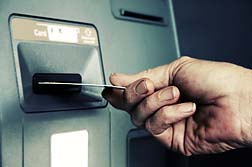 In September of 2003, the American Express Company (AEC) started a promotional credit card reward program in which it claimed that users of its "Blue Cash" credit card ("Blue Cash Card") could earn up to 5 percent cash back on purchases made with the card.
In September of 2003, the American Express Company (AEC) started a promotional credit card reward program in which it claimed that users of its "Blue Cash" credit card ("Blue Cash Card") could earn up to 5 percent cash back on purchases made with the card.In 2006, the plaintiff, H.R. Homa, filed a complaint seeking class action status, contending that both American Express and its Centurion unit failed to award him the promised amount of cash, which was in violation of the New Jersey Consumer Fraud Act. " Our client [Mr Homa] thought he was getting 5 percent back but when he discovered that the amount of his rebate was much less, he contacted my co-counsel," says Graifman. That was the genesis of this case.
"After the complaint was filed in New Jersey, the defendant (AEC) moved to have the case dismissed, claiming that a clause in the customer agreement required all customers to arbitrate their claims and barred them from being part of the class action," says Graifman. "The lower court dismissed the case upholding the class action ban and the matter was appealed. The U.S. Court of Appeals for the Third Circuit has just rendered their decision last month, overturning the lower court and finding that card holders can assert the claim in a class action."
The decision by the Third Circuit has set precedence by clarifying that under New Jersey law, plaintiffs with small value consumer claims cannot be prevented from banding together in a class action to pursue their remedies. Such bands would make it economically unfeasible for these potential plaintiffs to pursue their claim.
Calculating a Rebate
You can't do the math! At least not based on the materials AMEX publicly disseminated. Graifman says there is a mathematical equation that only AMEX knew. At some point later on, they clarified the term. There are two aspects to the Blue Cash deal. First, you can earn up to 3 percent cash back for purchases made (i.e., total spend) and second, you can earn up to 5 percent, based upon the balances you carry on your card.
"For example, if your total annual spending on your card is between $6,000 and $50,000 you are supposed to get 3 percent back," Graifman explains. "In addition, you get a 2 percent bonus if you carry a balance on the card— giving a 5 percent total.
But the reality was that if you carried $6,000 or more, they gave you lesser percentages on the amounts up to $6,000, plus the 2 percent if you carried a balance. Therefore, your total could never reach 5 percent back. So the way it was structured, you could never get a total of 3 percent on your total spend because, for anything spent under $6,000 you would get the lesser percentage.
READ MORE AMEX BLUE CASH LEGAL NEWS
In other words, while someone spending $6,001, would assume based on the marketing materials that they are getting 3 percent back on the entire amount spent, in reality they only got 3 percent back on the one dollar over the first $6000. It was a tiered structure and that was not explained in the advertising or marketing materials. "Currently, the case is going back to the lower court to be litigated. Graifman says that if a consumer has used their AMEX Blue Cash Card, carried a balance and spent over the initial tier (up to $2,000) they would not have gotten the percentage that they would have been entitled to under the terms of the advertisement.
Still confused? If you believe that AMEX owes you a rebate on the Blue Cash Card, an attorney can help determine if you indeed have a case.




